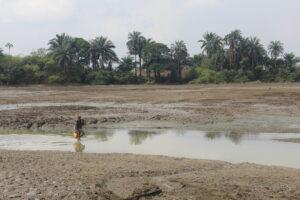Fighting for Water and Women’s Lives
On the riverbanks of Nigeria, women like Cynthia Bright are facing a crisis. She, like many Niger Delta women, survives by fishing. But as corporations extract more and more oil and gas, she’s seen the Kalakpo stream, the main source of drinking water for her community, become polluted. The water has turned brown and green and killed the fish she depends on.
Women in West Africa know intimately how their rivers flow through wellsprings of patriarchy, power, and profit. They are confronting these head-on with movements and community organizations like Nigeria’s Kebetkache Women Development and Resource Center, a Grassroots International grantee. United, they are defending both water and their rights as women who depend upon it.
“To us in Kebetkache, environmental justice is a women’s rights issue,” Emem J. Okon, the executive director of Kebetkache, told us in an interview. “The struggles for the recognition of the rights of women are directly linked to issues of land, access to clean water and clean air.”
Struggles for Water and Environment
Nearly 20 years ago, Nigerian women besieged the oil giant Chevron’s facilities. For 11 days, 200 Ugborodo women occupied a tank farm and blocked workers from entering or leaving, shuttering operations. Ijaw women, in a separate action, staged sit-ins and occupations at flow stations.
Unarmed, they faced down the corporation and the Nigerian military, who even shot at the protesters, resulting in the drowning of a young girl on a river flotilla. In spite of the repression and lopsided power, Nigerian women squeezed concessions from the multibillion-dollar multinational. Chevron agreed to invest in the community, including by providing clean water pumps.
As Emem recounted in a 2012 interview, “women achieved in 11 days what the men could not achieve in decades.”
Ongoing struggle
Since then, Kebetkache has continually fought Chevron and other multinational oil companies with nonviolent direct action, whether on the delta’s riverbanks or at shareholders’ meetings.
They have continually documented the depths of contamination and disaster facing their communities from oil and gas extraction. Besides brackish polluted water and dead fish, life expectancy has dropped to just 41 years and birth complications among pregnant women have increased.
Women of Kebetkache have presented these facts and told their stories in stakeholder forums, pressuring government officials directly. At one such forum in 2020, an official from the Ministry of Environment ultimately committed to conducting an environmental, social and human rights impact assessment based on women’s reports of oil spillage in their area. In another recent instance, Kebetkache’s pressure led to new investments in road infrastructure in a community.
Grassroots International’s support helps Kebetkache to build solidarity, deepen consciousness, and appreciate individual diversity while promoting an inclusive process. It means finding the solution together, identifying a common language, identifying the thread that holds us together and linking local actions to global actions. — Emem J. Okon, Executive Director of Kebetkache Women Development & Resource Centre
Women Building Power
In pairing environmental justice and feminism, Kebetkache enables women to build power in their communities.
At the intersection of resource extraction and theft, corporations, the military and individuals have committed heinous acts of gender-based violence. Abductions, assaults, and sex crimes are far too common in the delta. Kebetkache has concentrated on addressing the resulting psychosocial trauma with specific healing programs for the women affected.
This violence has concrete roots, including the exclusion of women from official arenas of power, and the misogynist ideas that flow from that.
“While corporations negotiate with the male-dominated community governance structures and the male-dominated federal and state government, they exclude women from the process,” Emem explained. “The negotiated joint extractive ventures destroy the environment which is the essence of life for the Indigenous women.”
“At the center of our theory of change is the commitment to raise women leaders at the grassroots who can engage with stakeholders at all levels.”
Cynthia
Cynthia Bright is one such woman. First cultivated by Kebetkache as a potential leader starting in 2016, she’s since mobilized women in her community to advocate for compensation for pollution and an end to nearby gas flaring. They have confronted male-dominated corporate-community committees to demand accountability and women’s inclusion in the process. As Kebetkache wrote to us, “Women’s voices are now being heard and they are participating in the spaces where they otherwise used to be excluded.”
“It thrills me to see community women from the Niger Delta speak in international forums on how negative extractive practices have affected them,” Emem told us. “Women want a development model that responds to the needs of women.”
These thoughts get to the heart of the grassroots feminist struggles waged by the women of Kebetkache — and their counterparts across the globe — to defend their water, their lands, and their very lives.

